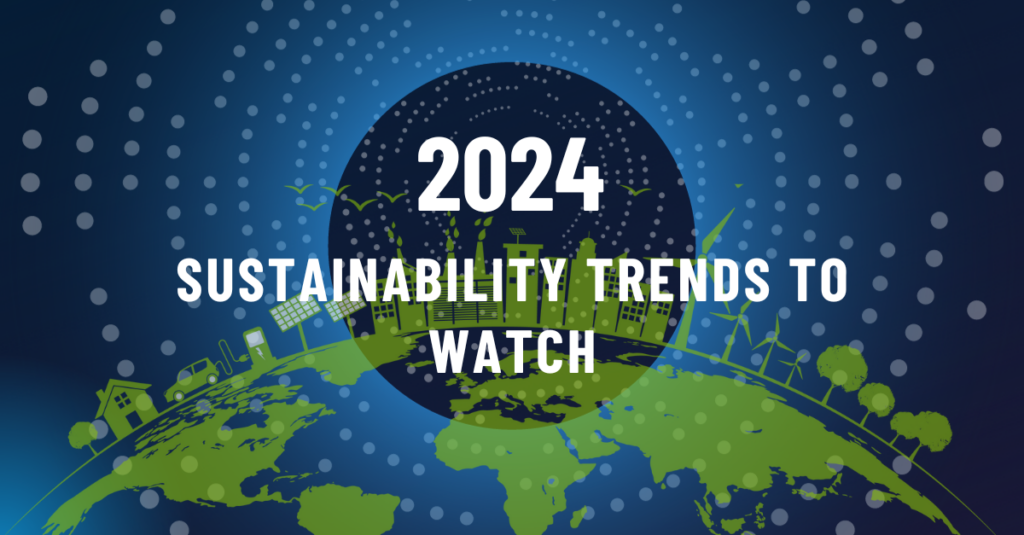1. Climate Risks Stay Prevalent
Last year, the real cost of climate change was thrown into perspective and if 2023 was any indication of what’s to come, we are in for another year of smashing records when it comes to weather and disasters. 2023 was just confirmed as the world’s hottest year on record. The climate change-fueled weather anomalies were endless, with the greatest number of billion-dollar disaster events the U.S. has ever seen. Of particular concern is the fact that 2023 ended the year 1.78°C warmer, already north of the 1.5°C mean global warming target set by the Paris Agreement in 2016. Going forward, climate scientists anticipate more record-breaking temperatures, contributing to dangerous storms, droughts, wildfires, and floods. As of now, the duration of the current El Niño weather pattern is uncertain, though it’s expected to persist through at least the first half of this year.
However, 2023 ended on a positive note with countries at the UN’s biggest climate conference, COP28, verbally agreeing to transition away from fossil fuels in energy systems for the first time, including accelerating the phase down of unabated coal. With climate risks becoming stark realities and technological advancements shaping environmental strategies, this year should be transformational in many regards as human ingenuity and AI alike take tangible steps to reduce emissions, overconsumption, and resource exploitation.
2. Climate Regulation is Here (And More is Coming): Preparing for Implementation
2023 was also a major turning point for consolidated global sustainability reporting with nearly all the global reporting standards setters collaborating to make their approaches “interoperable.” As many of the requirements and deadlines for the dominant reporting frameworks and regulations are now known and in the immediate process of releasing further guidance, companies will imminently face the stages of preparatory work for compliance. Implementation is going to be one of the larger themes of 2024, where 2023 saw the groundwork being laid with consolidation and finalization of the ESG reporting landscape. The policies, standards, and laws to watch in 2024 are outlined below:
- SEC Climate Disclosure Rule: After significant delays to it’s March 2022 proposed rule, the SEC is considering finalizing the rule in April of this year, requiring companies to report their GHG emissions. We can expect potential changes to the contents as there have been significant developments since it was first proposed in 2022 from the global landscape of climate reporting: namely the European Union’s Corporate Sustainability Reporting Directive, the International Sustainability Standards Board’s sustainability standards, and California’s climate reporting law.
- California Climate Disclosure Rules: California has taken the lead in pushing for corporate climate responsibility by passing groundbreaking legislation that requires large companies that do business in California to report on scope 1,2, and 3 emissions and to disclose climate-related financial risk. Governor Newsom signed both the Climate Corporate Data Accountability Act (SB 253) and the Climate-Related Financial Risk Act (SB 261) into law on October 7, 2023. While companies subject to the compliance criteria will have to report scope 1 and 2 emissions starting in 2026, and scope 3 in 2027, 2024 will be a crucial year to start preparing for those entities that are at ground zero when it comes to sustainability- particularly in regard to data collection. It is also important to note that the influence and trickle-down effects of this ruling will extend well beyond the scope of businesses simply located in California, as it encompasses any large public and privately owned company doing business in California, one of the largest economies in the world. Even if you do not conduct business in the state, suppliers, and financial institutions that you work with that have ties in California may start to quasi-mandate more sustainability information to comply themselves- especially regarding the scope 3 mandate.
- By the end of 2024, companies subject to California’s new Climate Corporate Data Accountability Act (SB253) will need to establish processes for auditing their 2025 emissions ahead of 2026 reporting.
- Building Performance Standards: Leaders across the U.S. are exploring building performance standards (BPS) to reduce excessive building energy use and carbon emissions. As BPS becomes more commonplace building on the work of mandatory benchmarking ordinances, building owners, architects, consulting engineers, and facility managers — who have historically been most concerned with implementing energy code requirements as the primary energy-related regulations – will need to have a thorough understanding of the local BPS targets in addition to energy codes. Launched by the Biden Administration, the National Building Performance Standards Coalition comprises a nationwide group of over 30 states and local governments that have committed to inclusively design and implement building performance policies and programs in their jurisdictions. Some states include California, Colorado, and Washington, and cities include New York City, Washington, D.C., St. Louis, Boston, and many others. According to the White House, between the federal building performance standards and the addition of California to the coalition, one-quarter of all commercial, federal, and multifamily buildings in the U.S. are either covered by or moving toward sustainable building performance standards.
- EU’s Corporate Sustainability Reporting Directive CSRD: The CSRD entered into force on January 5th, 2023. Analysts predict that 50,000 companies – including 10,000 non-EU companies, ~4,000 based in the US and Canada, will have to report. The EU Parliament approved the final version of the ESRS (European Sustainability Reporting Standards) in July. These standards are what companies must use to report under the CSRD. Companies will have to start reporting using the ESRS beginning in 2024.
- International Sustainability Standard Board’s (ISSB) IFRS S1 & S2: The ISSB released their first two sustainability reporting standards in mid-2023, S1 General Requirements for Disclosure of Sustainability-related Financial Information Sustainability Reporting and S2 for Climate-related Disclosure. Companies can begin using the ISSB Standards to report on their sustainability starting this year, with some countries going so far as to make the ISSB the baseline for their reporting regulations in 2024. The ISSB’s climate-related standard (S2) will also be integrated into the CDP questionnaire, which companies can begin using from April this year when the CDP reporting portal opens up.
- Corporate Sustainability Due Diligence Directive (CSDDD) – European Parliament: Targeting large EU companies and non-EU companies with large EU undertakings, this new law aims to ensure businesses identify and mitigate negative human rights and environmental impacts in their value chains.
- SBTI: New guidance from the Science Based Targets initiative on the use of environmental attribute certificates, including carbon credits, in decarbonization goals should come out by summer.
Interoperability Moves in 2023 Providing Clarity in 2024:
Globally, corporate sustainability reporting is gradually aligning with either CSRD, the ISSB, and/or GRI, along with the GHG Protocol. This has been in part enabled by the European Financial Reporting Advisory Group (EFRAG) and Global Reporting Initiative (GRI) forming an agreement during COP28 to align the CSRD’s European Sustainability Reporting Standards with GRI. This collaboration includes the creation of a GRI-ESRS Interoperability Index, marking a significant move towards standardized sustainability reporting across Europe. Additional interoperability work and conversations have also taken place between EFRAG and the ISSB. The ISSB also helped clarify the alphabet soup when they took over the Task Force on Climate-Related Financial Disclosure (TCFD) responsibilities in late 2023. The TCFD has been a revolutionary tool for companies disclosing climate risks and opportunities, and will hopefully, along with the SASB standards create an excellent bedrock for reporting to ISSB standards in 2024. In addition, the CDP questionnaire – used by ~23,000 companies, will now align with the ISSB climate standard.
In the United States, federal policy gridlock is leading states to develop their own climate policies, complicating compliance for larger international companies. The trend towards increasing regulations in the US is expected to continue, with more states introducing legislation similar to California’s SB 253 and SB 261. Already, New York has also introduced a bill that requires certain companies to report on their emissions. At the same time, other states like Colorado and Maine have taken steps to regulate plastics, packaging, and waste.
3. Sustainability-related Skills Are Integrated Into Various Rolls Across a Business
Corporations are finally starting to view sustainability as an operational priority that permeates the entire business model and requires interconnected collaboration across all functional teams. Sustainability as a concept is ultimately a multifaceted domain that intertwines in harmony with financial stability, demanding expertise from various sectors and roles (without which may lead to oversight and operational blindspots). For emphasis, more organizations are creating ESG controller positions, a role that oversees and manages the integration of ESG issues into an organization’s operations and financial reporting protocols. 2024 will hopefully continue the expansion and integration of sustainability skills into other corporate roles—especially finance, legal, and strategy.
4. Access to Auditable, Comprehensive ESG Data, and Rigorous Reporting Capabilities Is Essential
Sustainability and climate-related data will be subject to the same rigor and assurance as that of financial grade data going forward. Addressing the mounting global regulatory requirements for enhanced disclosure of ESG-related impacts, risks, and opportunities with required external auditing will necessitate quality data, and consequently, the tools and people that allow this data to be collected as efficiently and accurately as possible. Access to automated, and centralized energy and emissions data points, in addition to waste and water metrics with the resulting predictive analytics and actionable insights to accompany it will be crucial. Other benefits to assuring your data in the interim before mandates go into effect, is combatting greenwashing claims and possible related litigation surrounding your voluntary reporting initiatives.
Because financial and non-financial information is increasingly interrelated, and tied together in future reporting mandates, specialized financial grade auditors are best suited to reviewing your ESG information. According to a study from KPMG, only 25% of companies feel that they have the ESG policies, skills, and systems in place to be ready for ESG assurance. AI will also become a key tool for sustainability, ESG reporting, and productivity, as the quantity and complexity of data that needs to be collected, analyzed, and audited continues to increase.
5. AI and Sustainability Become Intertwined
At the heart of 2024 data and technology advancements will be the power of generative AI to analyze data needed for climate action and compliance and the applications for sustainability will become increasingly prominent in 2024. In the past few months, we’ve all experienced how ChatGPT is making information accessible in ways that weren’t possible before. Similarly, generative AI for climate change will be revolutionary in increasing access to emissions data.
Having accurate data is crucial for trust and integrity, internal decision-making, and compliance with rapidly emerging climate disclosure regulations. While accessing granular data has been a huge challenge for large organizations with a global supply chain, generative AI is helping to close the sustainability data gap. The complexity of ESG data requires advanced analytics, and AI can provide the necessary tools to process vast amounts of information, identify patterns, and assess companies’ sustainability performance.
6. An Election Year Ups the Stakes For Pro and Anti-ESG Agendas
Globally, we’re witnessing several active conflicts unfold, and there is a lot of uncertainty around the 2024 Presidential election, but it won’t stop economically and culturally influential states from forging ahead when it comes to climate initiatives. With a fraught and turbulent election year, we can expect renewed scrutiny over political spending and influence and the revival of questions on what corporations should and shouldn’t be doing in regards to their investments and corporate responsibility. However, Companies will still need to remain cautious about how they discuss the concept of ESG specifically in external communications amid presidential and congressional elections and expectations for an increase in pro- and anti-ESG legislation in the United States, and in the wake of 50 countries and regional bodies experiencing elections in 2024.
7. Increased Greenwashing-related Litigation in 2023 Leads to More Defined Legal Terms in 2024
Moving forward into 2024 and beyond, the notion of greenwashing — a term frequently employed to call out insufficient or misleading sustainability efforts and disclosures by corporations — is expected to be more clearly defined legally and carry weightier repercussions.
Greenwashing carries with it reputational, regulatory, and litigation risks; and with no consistent legal definition, the concept of greenwashing will vary by product, service, regulator, and jurisdiction. The EU is making considerable progress in eradicating greenwashing, encompassing the development of new rules designed to limit false advertising and to offer consumers enhanced information about products.
8. Private Companies Prepare for Impact
Sustainability reporting will expand to include private firms because of Scope 3 rules, which require reporting companies to monitor all indirect emissions that occur throughout the supply chain and among third-party vendors, particularly as the result of California and European Union regulations. regardless of public disclosure, private firms of all sizes that supply to major public or private corporations will probably need to initiate or improve their greenhouse gas accounting methods.
9. Scaling The Energy Transition and Firm Decarbonization Efforts
Hopefully, 2024 will be a year of action when it comes to transitioning away from fossil fuels by corporations, and greater procurement of renewable energy, building on the mounting trends in renewables popularity we have seen in 2023. The International Energy Agency (IEA) recently predicted in its annual report that global demand for oil, natural gas, and coal will peak in about seven years. A separate study that came out in October, suggests the world may have reached “a global irreversible solar tipping point,” with ever-cheaper solar dominating electricity markets purely because of market forces, without any additional climate policies. The transition to cleaner energy is now solidified in unstoppable market forces and undoubtedly becoming a global cornerstone for affordable energy in all economic sectors. Companies adapting to the new realities of increasing energy demand and pricing with excess strain on the grid growing by the year may finally find themselves amenable to onsite or offsite renewable procurement in 2024. Sweeping government incentives like the Inflation Reduction Act will only further compound the financial viability of renewables for small to medium-sized enterprises in all states. The Inflation Reduction Act has catapulted the US to the fore of the race to localize clean tech, notably by extending generous subsidies to technology producers. More progress in 2024 may expand on achievements from COP28, when the U.S. announced new rules to cut methane emissions in oil and gas production, likely to change the energy cost equation.
10. The Built Environment Evolves
Among the industries affected by the wave of new sustainability legislation and regulatory requirements, the complexities within the real estate sector and the built environment are especially unique. The introduction of BPS in addition to reporting requirements adds a layer of costly challenges to the real estate sector. These standards, designed to specifically enhance energy efficiency and sustainability in the built environment, may require retrofits and upgrades to existing structures. Real estate companies must prepare to navigate the implications of these standards, not only in terms of compliance but also in terms of managing the associated costs, communicating the necessity of changes to tenants and investors, and carefully monitoring the regulatory landscape to ensure new buildings are developed with compliance top-of-mind. In 2024, companies should keep an eye on developments to the policies below that point to growing trends in the management of the built environment:
In 2024 businesses are embracing the concept of ESG and operational sustainability not just for compliance, but as a chance to fundamentally transform their business models, accepting the need to remain resilient and optimize firm value in the face of increasingly complex external risks and mounting global conflicts. Sustainability, a once niche concept at the periphery of business operations will now take on a central role for all industries that permeates and revises long-held procurement strategies, financial management, and marketing and communication practices. Finally, as legislation kicks off the globe, and more visibly across Europe, the result-driven mindset for sustainability efforts will be key.
More About WatchWire
WatchWire by Tango is a market-leading, energy and sustainability data management platform that uses cloud-based software to collect, automize, and analyze utility, energy, and sustainability data metrics. WatchWire streamlines, automates, and standardizes your sustainability reporting process by integrating directly and/or providing reporting exports to ENERGY STAR Portfolio Manager, LEED Arc, GRESB, CDP, SASB, GRI, and more. The platform provides customizable dashboards, which allow asset managers, sustainability managers, engineers, and more to monitor individual key performance indicators (KPIs) and create custom views for specific use cases.
To discover more about WatchWire and its capabilities, you can visit our website, blog, or resource library, request a demo, or follow us on LinkedIn, Instagram, or Twitter to keep up-to-date on the latest energy and sustainability insights, news, and resources.
 Top Sustainability Trends to Watch in 2025
Top Sustainability Trends to Watch in 2025

 Log In
Log In









